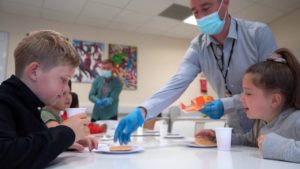The Food Insecurity and Learning Loss Report is part of a pilot project designed to help tackle food insecurity during the school summer holiday period this year.

Youth work has been shown to play an important role in tackling the learning loss associated with food insecurity, with 92% of young people also reporting improved mental wellbeing.
The Food Insecurity and Learning Loss report, a partnership between YouthLink Scotland and The Lines Between, outlines findings from a pilot of six youth work programmes, funded by Scottish Government, as part of a pilot project to help tackle food insecurity during the school summer holiday period this year.
The pilot ran demonstrates youth work’s contribution to preventing learning loss by maintaining young people’s skills, motivation and engagement with education in holiday periods. The approach proved to be an effective model for delivering opportunities for young people to gain accreditation, develop confidence, engage with new experiences and build relationships with positive role models in their communities.
Some of the key findings showed that almost 100% of young people had improved their family relationships. 94% were eating healthier food and cooking together.
Losing interest in school is one of the impacts of food insecurity for young people, but 80% of involved in this innovative pilot project said they were actually looking forward to returning to school.
For many young people living with food poverty, they feel stigmatised by their circumstances. The pilot had a significant impact on young people’s mental wellbeing with 92% saying they felt more positive about themselves and 94% reporting they had more confidence as a result.
Scottish Government Communities Secretary Aileen Campbell said: “Scotland’s vibrant youth work sector plays a crucial role in supporting children and young people’s health and wellbeing, supporting education recovery and in closing the attainment gap. Throughout the coronavirus (COVID-19) crisis we have seen the sector rise to the challenge in supporting young people across Scotland.
“We are aware of the economic impact of the pandemic for families, so I am pleased that with this additional support, YouthLink have coordinated the provision of food alongside innovative youth work activity. This has helped relieve some of the financial pressure on families and enabled them to enjoy preparing food and eating together in a dignified way.
“The Scottish Government has now invested over £130 million in tackling food insecurity caused by the pandemic, including the provision of free school meals during the holidays up to Easter 2021.”
Commenting on the findings of the report, Marielle Bruce, YouthLink Scotland Youth Work and Schools Partnerships Manager said: “We’re delighted to publish our findings today. Important learning about the unique position of youth work in the community has emerged. CLD and youth work partners did not face the barriers to engagement with families that some education and social work partners encounter.
“Through contact about food and activities, they were able to identify and address hidden needs and make new connections with families who are struggling.
“Food insecurity is a family and community issue. Including families in a project is an effective way to maximise reach and impact. A family approach can create the shared knowledge, skills and positive experiences required to bring about a lasting change. Our evaluation demonstrates potential for this project to lead to profound positive change going forward.”